Table of Contents
ToggleIn the dynamic business landscape of the UK, effective inventory management is a critical component for small businesses striving to stay competitive and maintain profitability. Inventory Stock Management Software has become an essential tool, enabling businesses to streamline operations, reduce waste, and enhance customer satisfaction.
With countless options available, choosing the right solution can be daunting. This guide highlights the top 10 inventory stock management software solutions tailored to small businesses in the UK.
What Is Inventory Stock Management Software?
Inventory stock management software is a digital solution designed to streamline the tracking, monitoring, and management of a business’s inventory. These systems provide features such as real-time stock tracking, automated reordering, and integration with other business tools like accounting or eCommerce platforms.
Key Benefits for Small Businesses
- Efficiency: Automates repetitive tasks like reordering.
- Accuracy: Reduces human error in stock counts.
- Scalability: Grows alongside your business.
How to Choose the Right Inventory Stock Management Software for Your Small Business?

When selecting inventory stock management software, consider the following factors:
- Budget: Ensure the software fits your financial constraints while providing necessary features.
- Ease of Use: Opt for user-friendly interfaces that don’t require extensive training.
- Integration: Look for solutions that integrate with your existing tools like accounting software and e-commerce platforms.
- Scalability: Choose software that can grow with your business.
- Support: Ensure the provider offers robust customer support, especially for small businesses new to inventory management tools.
Top 10 Inventory Stock Management Software for Small Business
1. Zoho Inventory
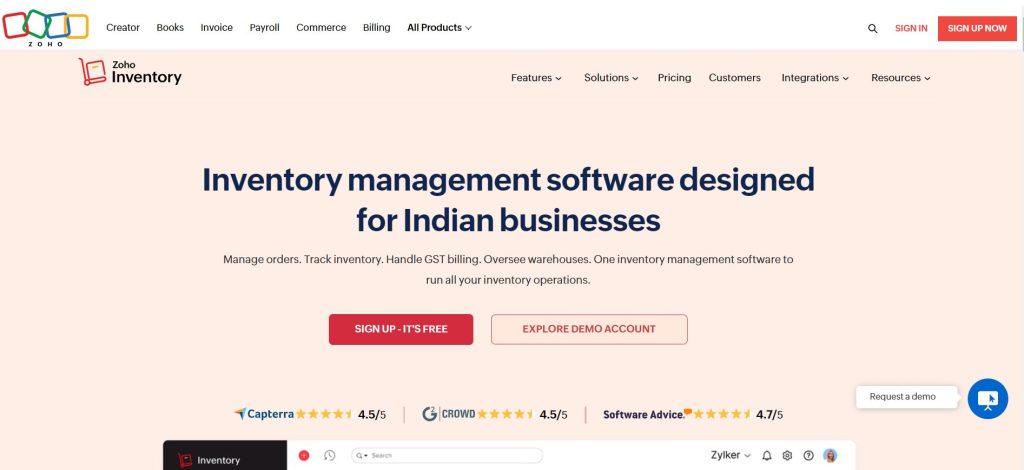
Overview: Zoho Inventory is a cloud-based solution offering robust tools for inventory tracking and order management. Its seamless integration with e-commerce platforms makes it a favourite for small businesses. With real-time tracking and reporting, it provides visibility across the entire supply chain.
Key Features
- Multi-channel inventory management
- Order fulfilment automation
- Integration with Shopify, Amazon, and eBay
- Real-time shipment tracking
Pricing: Starts at £39/month for paid plans, with a free tier available.
Best For: Small businesses needing scalable inventory management with e-commerce integrations.
2. QuickBooks Desktop Enterprise
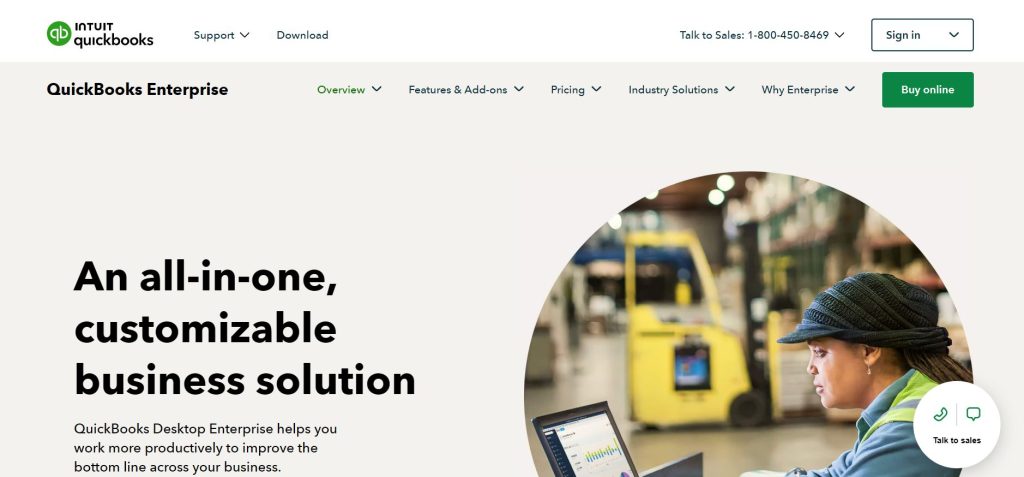
Overview: A powerful accounting and inventory management tool, QuickBooks Desktop Enterprise combines financial and inventory functionalities in one platform. It’s designed for businesses requiring detailed oversight of both operations and finances.
Key Features:
- Advanced inventory tracking
- Order management and fulfilment
- Comprehensive reporting tools
- Integration with other QuickBooks services
Pricing: Starts at $1,922/year.
Best For: Medium to large businesses needing integrated accounting and inventory management.
3. InventoryBase
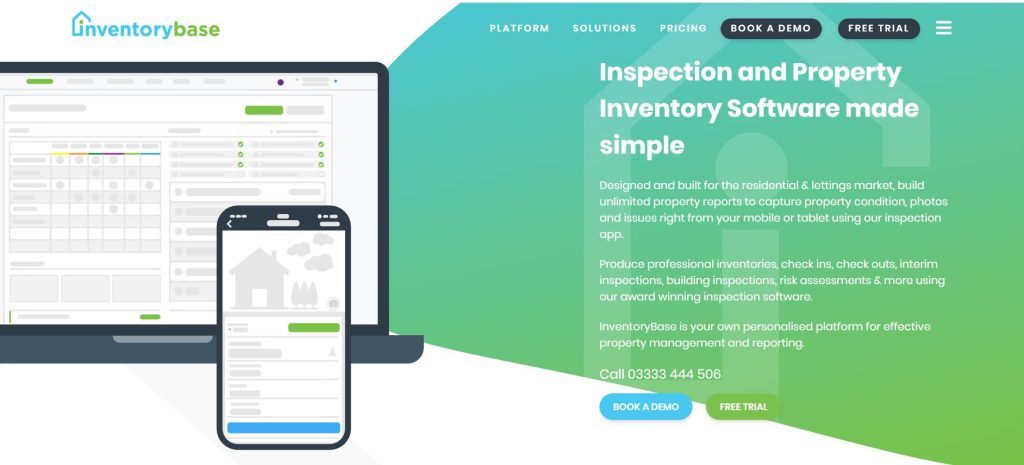
Overview: InventoryBase provides advanced tools for multi-warehouse management, purchase orders, and real-time stock tracking. It is designed for businesses requiring detailed oversight of multiple locations and product categories.
Key Features:
- Multi-warehouse support with bin locations
- Purchase order and invoice management
- Integration with marketplaces and retail platforms
- Real-time stock level monitoring
Pricing: Starts at $35/month.
Best For: Businesses with complex inventory needs spanning multiple warehouses.
4. TradeGecko (Now QuickBooks Commerce)
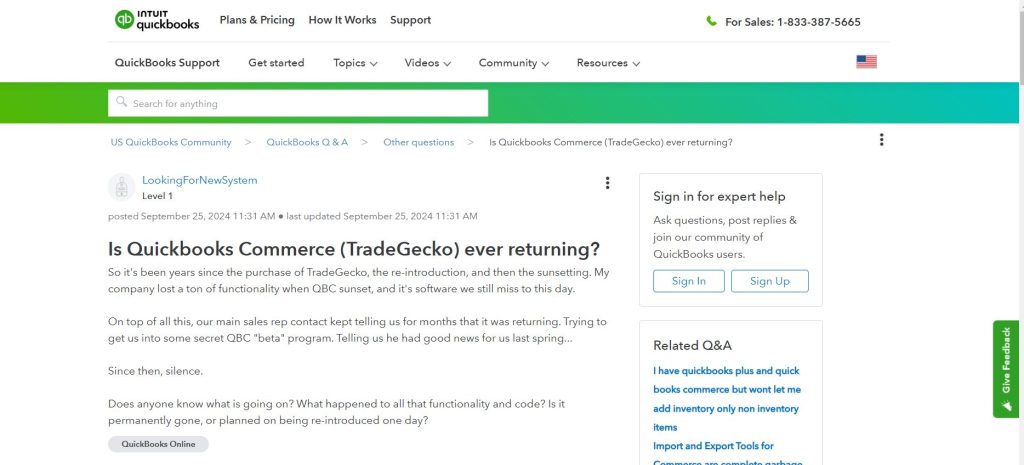
Overview: QuickBooks Commerce, formerly TradeGecko, is ideal for managing inventory across multiple sales channels. It is well-suited for businesses needing strong B2B e-commerce and order management features.
Key Features:
- Multi-channel inventory control
- B2B and wholesale management tools
- Centralised order tracking
- Customisable workflows
Pricing: Contact vendor for pricing details.
Best For: Small to medium businesses dealing with wholesale and B2B operations.
5. Brightpearl
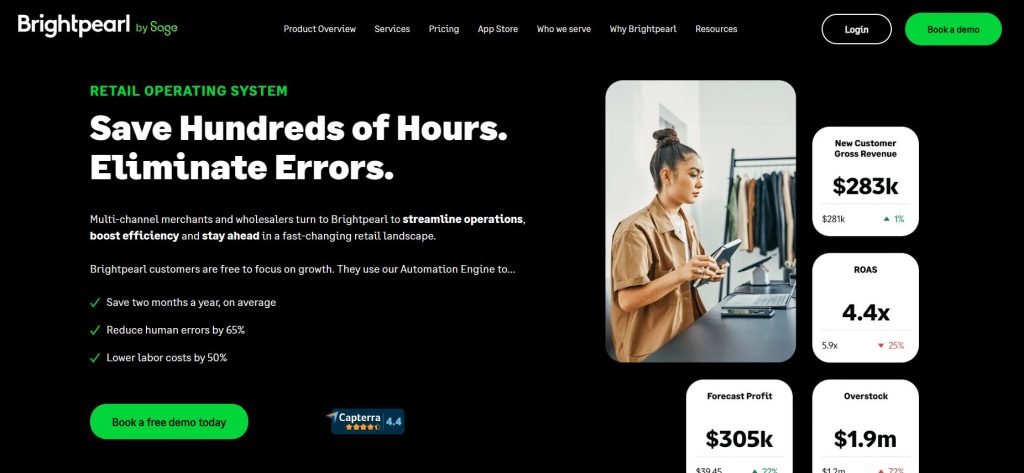
Overview: Brightpearl is an all-in-one retail management software that integrates CRM, accounting, and inventory tracking tools. Its omnichannel capabilities are ideal for retailers managing inventory across multiple sales platforms.
Key Features:
- Omnichannel inventory management
- Demand forecasting tools
- CRM and accounting integrations
- Real-time stock updates
Pricing: Custom pricing upon request.
Best For: Retailers looking for omnichannel solutions with built-in CRM.
6. DEAR Systems
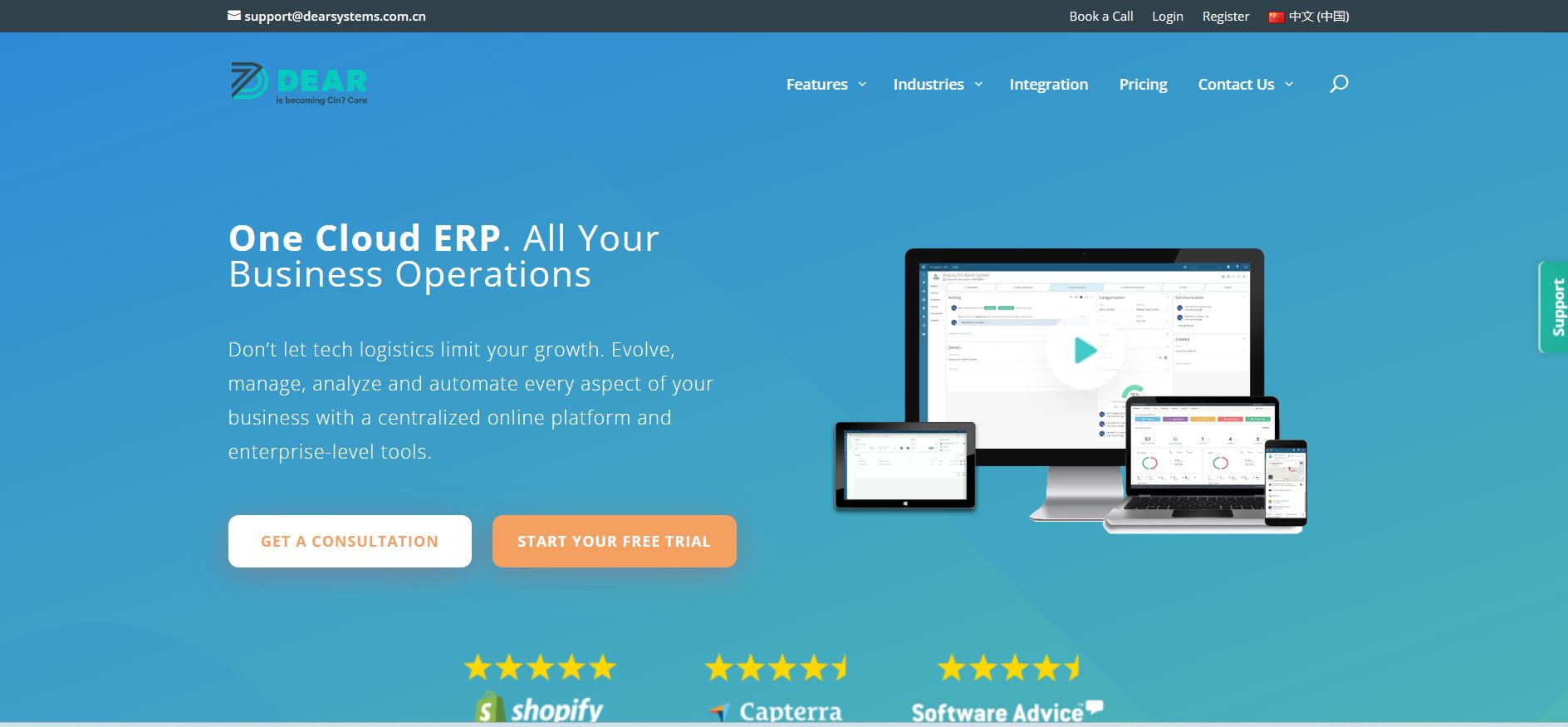
Overview: DEAR Systems offers a cloud-based solution with features for inventory tracking, batch management, and multi-currency support. It’s particularly useful for businesses looking to scale operations globally.
Key Features:
- Batch tracking and expiry date monitoring
- Multi-currency support for global trade
- Centralised inventory and order management
- Real-time analytics and reporting
Pricing: Starts at £349/month.
Best For: Businesses planning international expansion.
7. Square for Retail
Overview: Square for Retail combines inventory management with an integrated POS system, making it an excellent choice for retail businesses. It simplifies customer transactions and ensures accurate stock level tracking.
Key Features:
- Integrated point-of-sale system
- Real-time inventory updates
- Automated stock adjustments
- Customer relationship management tools
Pricing: Contact vendor for pricing details.
Best For: Retail businesses seeking an easy-to-use POS with inventory features.
8. Vend by Lightspeed
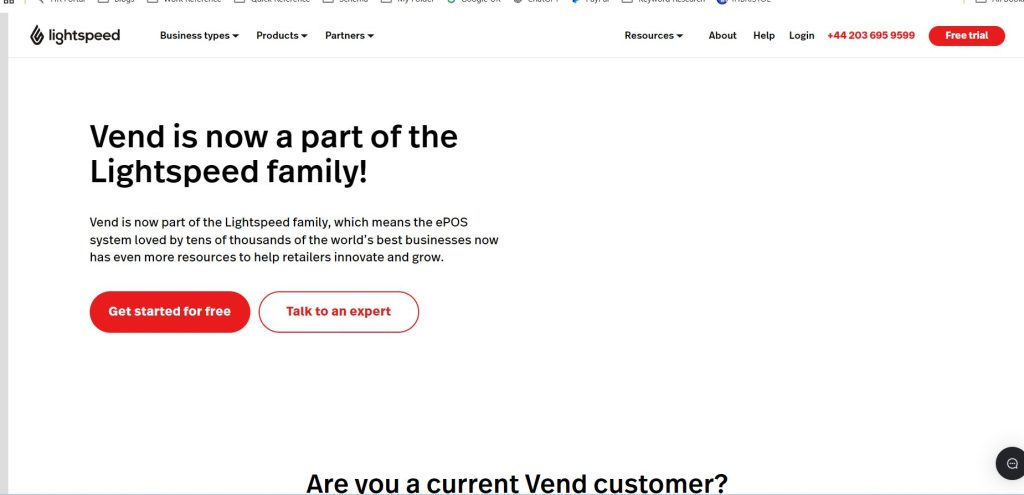
Overview: Vend, now part of Lightspeed, offers robust POS and inventory management capabilities tailored for retail businesses. It integrates seamlessly with e-commerce platforms and provides detailed reporting for better business insights.
Key Features:
- Cloud-based inventory management
- Multi-location stock tracking
- Integration with Shopify and WooCommerce
- Detailed sales and inventory reports
Pricing: Starts at $89/month.
Best For: Retailers managing multiple locations and sales channels.
9. Fishbowl Inventory
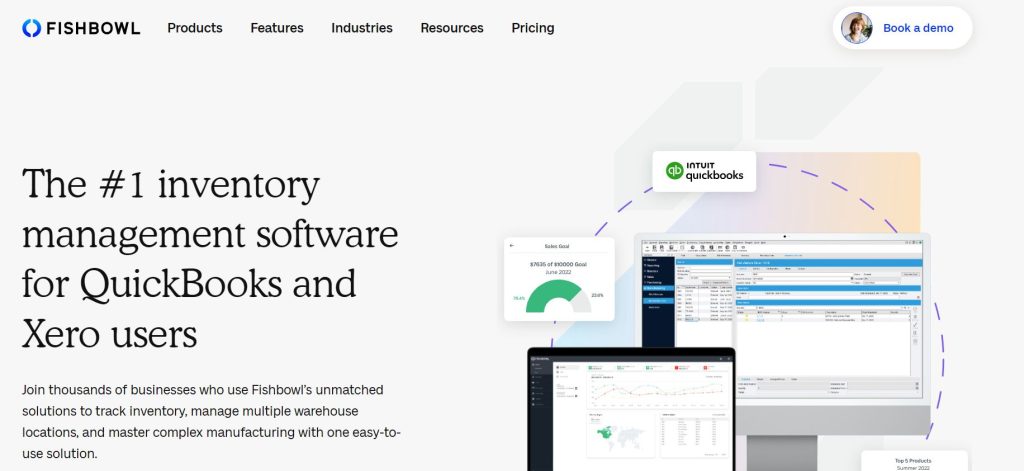
Overview: Fishbowl Inventory provides powerful inventory tracking, warehouse management, and manufacturing solutions. It’s suitable for small businesses needing advanced tools to manage inventory across locations.
Key Features:
- Manufacturing and warehouse management
- Barcode scanning and inventory tracking
- Integration with QuickBooks
- Inventory forecasting tools
Pricing: Custom pricing based on business needs.
Best For: Manufacturing and warehouse-based businesses.
10. Unleashed Software
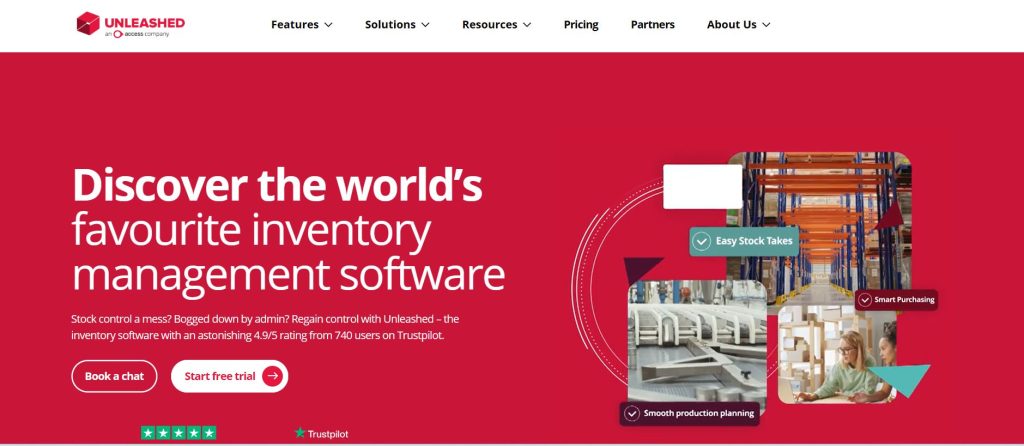
Overview: Unleashed Software is a cloud-based inventory management tool designed for businesses needing detailed visibility into their supply chain. It offers tools for cost tracking, stock valuation, and real-time analytics.
Key Features:
- Real-time inventory control
- Cost and stock valuation tools
- Multi-channel sales integration
- Detailed supply chain analytics
Pricing: Starts at $380/month.
Best For: Businesses requiring comprehensive supply chain management.
Common Mistakes to Avoid When Managing Inventory
Effective inventory management is crucial for small businesses to maintain profitability and operational efficiency. However, several common mistakes can disrupt this process and lead to inefficiencies. Here’s a closer look at these pitfalls:
1. Relying on Manual Processes
Many small businesses rely on manual methods, such as spreadsheets or handwritten logs, to track inventory. While this may seem cost-effective initially, it often leads to errors, such as miscounts or missed updates. Manual processes are also time-consuming and can struggle to keep up with the complexities of a growing business, making it harder to maintain accurate stock levels.
2. Neglecting Software Updates
Using outdated inventory management systems can significantly hinder operations. Old software may lack essential features, such as real-time tracking, integration with other business tools, or improved user interfaces. Additionally, outdated systems can pose security risks, potentially compromising sensitive business data. Regular updates ensure access to the latest tools and safeguards.
3. Ignoring Data Analytics
Inventory systems generate valuable data that can guide business decisions, such as identifying best-selling products, predicting demand, and optimizing stock levels. Failing to analyze this data results in missed opportunities to improve efficiency and reduce costs. Businesses that ignore analytics may overstock slow-moving items or experience shortages of high-demand products, negatively impacting revenue and customer satisfaction.
By avoiding these common mistakes, small businesses can improve their inventory management practices, ensuring accuracy, efficiency, and long-term success.
Benefits of Using Inventory Stock Management Software
Investing in the right inventory stock management software offers a wide range of benefits that can significantly enhance business operations.
1. Improved Accuracy and Reduced Errors
Manual inventory processes are prone to mistakes, such as miscounts or data entry errors. Inventory management software automates stock tracking and updates in real-time, ensuring accurate inventory records. This minimizes discrepancies and streamlines operations.
2. Enhanced Productivity and Efficiency
By automating time-consuming tasks such as order tracking, stock updates, and reordering processes, inventory software frees up valuable time for staff to focus on other critical business activities. This boosts overall productivity and operational efficiency.
3. Cost Savings Through Optimized Stock Levels
Effective inventory management software helps businesses avoid the costly risks of overstocking or understocking. With accurate forecasting and real-time tracking, businesses can maintain optimal stock levels, reducing storage costs and preventing lost sales due to stockouts.
4. Better Customer Service and Order Fulfillment
Inventory software ensures that businesses can fulfill customer orders promptly by maintaining accurate stock levels and streamlining the order processing system. Timely delivery enhances customer satisfaction and builds loyalty.
Adopting inventory management software is a strategic move that benefits businesses by improving accuracy, productivity, and customer satisfaction while reducing costs and inefficiencies.
Conclusion
Effective inventory management is pivotal for the success of small businesses in the UK. The right Inventory Stock Management Software can streamline your operations, reduce costs, and enhance customer satisfaction.
The options listed above cater to various industries and budgets, ensuring you find a solution tailored to your needs. Evaluate your business requirements, test the software, and invest in the one that best aligns with your operational goals. Whether you run a retail store, an e-commerce platform, or a manufacturing unit, these tools can help you stay ahead in the competitive market.
FAQ
What is the most affordable inventory software for small businesses?
Zoho Inventory and InFlow Inventory offer budget-friendly plans ideal for small enterprises.
Can inventory management tools integrate with accounting software?
Yes, many tools like TradeGecko integrate seamlessly with accounting platforms like QuickBooks.
Which software is best for UK-specific inventory needs?
Veeqo and Brightpearl are tailored for UK businesses with features like multi-channel support and compliance.
How do I know if my business needs inventory management software?
If you struggle with stock tracking or manual errors, implementing such software is highly recommended.
What are the common challenges in using such software?
Challenges include initial setup costs, training staff, and ensuring system compatibility with other tools.
Is cloud-based inventory software better than on-premise solutions?
Cloud-based solutions offer flexibility, real-time updates, and remote access, making them a preferred choice.
Can these tools help reduce inventory holding costs?
Yes, by optimising stock levels and providing demand forecasts, they significantly reduce holding costs.




